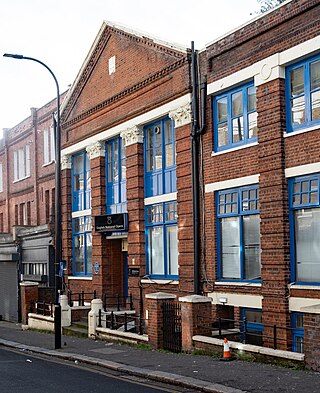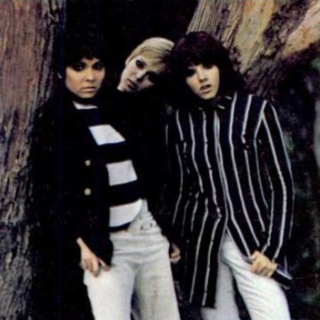Related Research Articles

The Animals are an English rock band formed in Newcastle upon Tyne in 1963. The Animals' original lineup consisted of deep-voiced frontman Eric Burdon, guitarist Hilton Valentine, bass guitarist Chas Chandler, keyboardist Alan Price, and drummer John Steel. Known for their gritty, bluesy sound, they balanced tough, rock-edged pop singles against rhythm-and-blues-orientated album material, and were part of the British Invasion of the US.

The Moody Blues were an English rock band formed in Birmingham in May 1964. The band initially consisted of Graeme Edge (drums), Denny Laine (guitar/vocals), Mike Pinder (keyboards/vocals), Ray Thomas (multi-instrumentalist/vocals), and Clint Warwick (bass/vocals). Originally part of the British beat and R&B scene of the early–mid 1960s, the band came to prominence with the UK No. 1 and US Top 10 single "Go Now" in late 1964/early 1965. Laine and Warwick both left the band in 1966, with Edge, Pinder and Thomas recruiting new members Justin Hayward (guitar/vocals) and John Lodge (bass/vocals). They embraced the psychedelic rock movement of the late 1960s, with their second album, 1967's Days of Future Passed, being a fusion of rock with classical music that established the band as pioneers in the development of art rock and progressive rock. It has been described as a "landmark" and "one of the first successful concept albums".

The Zombies are an English rock band formed in St Albans in 1961. Led by keyboardist/vocalist Rod Argent and vocalist Colin Blunstone, the group had their first British and American hit in 1964 with "She's Not There". In the US, two further singles—"Tell Her No" in 1965 and "Time of the Season" in 1968—were also successful.
The Beatles' bootleg recordings are recordings of performances by the Beatles that have attained some level of public circulation without being available as a legal release. The term most often refers to audio recordings, but also includes video performances. Starting with vinyl releases in the 1970s, through CD issues in the late 1980s, and continuing with digital downloads starting in the mid 1990s, the Beatles have been, and continue to be, among the most bootlegged artists.

The Chocolate Watchband is an American garage rock band that formed in 1965 in Los Altos, California. The band went through several lineup changes during its existence. Combining psychedelic and garage rock components, their sound was marked by David Aguilar's lead vocals, songwriting, as well as proto-punk musical arrangements. The band's rebellious musical posture made them one of the harder-edged groups of the period with many critics labeling them as America's answer to the Rolling Stones.

Having a Rave Up with the Yardbirds, or simply Having a Rave Up, is the second American album by the English rock group the Yardbirds. It was released in November 1965, eight months after Jeff Beck replaced Eric Clapton on guitar. It includes songs with both guitarists and reflects the group's blues rock roots and their early experimentations with psychedelic and hard rock. The title refers to the driving "rave up" arrangement the band used in several of their songs.

Metamorphosis is the third compilation album of the Rolling Stones music released by former manager Allen Klein's ABKCO Records after the band's departure from Decca and Klein. Released in 1975, Metamorphosis centres on outtakes and alternate versions of well-known songs recorded from 1964 to 1970.
Orange Bicycle was an English psychedelic pop band, which existed between 1967 and 1971. The band played a style influenced by The Beach Boys, The Beatles, The Rolling Stones, and the hippie counter culture. Previously, they acted as support, and backing band for the duo Paul and Barry Ryan as well as completing sessions for other vocalists, recording over 100 BBC Radio One sessions and appearing on UK TV.

"Heart Full of Soul" is a song recorded by the English rock group the Yardbirds in 1965. Written by Graham Gouldman, it was the Yardbirds' first single after Jeff Beck replaced Eric Clapton as lead guitarist. Released only three months after "For Your Love", "Heart Full of Soul" reached the Top 10 on the singles charts in the UK, US, and several other countries.

Decca Studios was a recording facility at 165 Broadhurst Gardens, West Hampstead, North London, England, controlled by Decca Records from 1937 to 1980.

The Cake was a 1960s girl group consisting of Jeanette Jacobs, Barbara Morillo and Eleanor Barooshian. They were managed and produced by Charles Greene and Brian Stone, two Sunset Strip impresarios who also managed Sonny & Cher, Buffalo Springfield and Iron Butterfly.
Tintern Abbey were a British psychedelic rock band that were formed in late 1966 and professionally active between 1967 and 1968. The band are best remembered for their single "Vacuum Cleaner," which has been included on several compilation albums over the years.

Randy Holden is an American guitarist best known for his membership of the West Coast acid rock group Blue Cheer and performance on their third album, New! Improved! (1969). His solo album Population II (1970) is considered to be one of the earliest examples of doom metal. Holden is also a painter.
Chris Demetriou, known as Chris Dee, born in Paphos, Cyprus, is a British songwriter, musician, and record producer. A cover of a song he co-wrote with John Kongos, "He's Gonna Step On You Again", appears in Q magazine's top hundred singles of all time.

The Onyx or Onyx were a psychedelic rock band formed in Wadebridge, Cornwall, England in 1965. Descended from a band called Rick & The Hayseeds, the group came to be known as The Onyx Set, named after an Onyx ring owned by original band member Mike Black-Borow. After various changes in the line-up they shortened their name to The Onyx and the classic line-up was formed. The band members were guitarist Alan Hodge, who had previously played with various local bands such as The Buccaneers and The Fabulous Jaguars, vocalist Tony Priest, bassist Dick Bland, keyboard player Steve Cotton and drummer Roger Dell.

The Dukes of Stratosphear were an English rock band formed in 1984 by Andy Partridge, Colin Moulding, Dave Gregory, and Ian Gregory. Modelled after psychedelic pop groups from the 1960s, the Dukes were initially publicised by Virgin Records as a mysterious new act, but were actually an XTC spin-off band. They recorded only two albums: 25 O'Clock (1985) and Psonic Psunspot (1987). In the UK, the records outsold XTC's The Big Express (1984).

The Yardbirds are an English rock band, formed in London in 1963. The band started the careers of three of rock's most famous guitarists: Eric Clapton (1963–1965), Jeff Beck (1965–1966) and Jimmy Page (1966–1968), all of whom ranked in the top five of Rolling Stone magazine's list of 100 greatest guitarists. The band's other members during 1963–1968 were vocalist/harmonica player Keith Relf, drummer Jim McCarty, rhythm guitarist Chris Dreja, and bassist Paul Samwell-Smith, with Dreja switching to bass when Samwell-Smith departed in 1966. The band had a string of hits throughout the mid-1960s, including "For Your Love", "Heart Full of Soul", "Shapes of Things", and "Over Under Sideways Down".

Bohemian Vendetta was an American garage rock and psychedelic band from Long Island, New York, who were active from 1966 to 1968. In addition to recording two officially released singles and several previously unissued demos, they cut a self-titled album, Bohemian Vendetta, released by Mainstream Records in 1968.
The Rovin' Flames were an American garage rock band formed in Tampa, Florida in 1965. Releasing five singles in their recording career, which was sometimes plagued by multiple line-up changes, the group is best-remembered for their final record "How Many More Times". The song was the Rovin' Flames biggest hit and remains their most accessible tune due to its appearances on several compilation albums.

"Leave Me Be" is a song by the English rock band the Zombies. Written by Chris White, the band's bass guitarist, "Leave Me Be" was released on a non-album single in October 1964. Following the release of the band's debut single "She's Not There" in July 1964, White wrote a handful of songs in between performances during the band's heavy schedule. Most of the work on the song occurred in August 1964, when the Zombies recorded both a demo and the backing track for it. The instrumentation largely differs from both earlier and later Zombies records; it features electric organ played by Rod Argent, compared to his previous usage of the electric piano. Together with record producer Ken Jones, they returned in September to finish the vocal track, which was disliked by most band members for its similarity to "She's Not There"; the vocals would eventually be re-recorded a few months later.
References
- 1 2 Blackham, David (2006). Complete Collection: 1965-1968 (CD booklet). Acme Records.
- 1 2 Unterberger, Richie. "The Flies - Biography". allmusic.com. Retrieved 17 April 2016.
- 1 2 3 Planer, Lindsay. "Complete Collection: 1965 - 1968". allmusic.com. Retrieved 17 April 2016.
- ↑ "Record Details". 45cat.com. Retrieved 17 April 2016.
- ↑ "The Flies "Complete Collection 1965 - 1968". lionproductions.org. Retrieved 17 April 2016.
- ↑ Dark Globe Julian Palacios, Plexus Publishing 2015
- ↑ "The Flies: Discography". discogs.com. Retrieved 17 April 2016.
- ↑ "Complete Collection: 1965 - 1968". lightintheattic.net. Retrieved 17 April 2016.